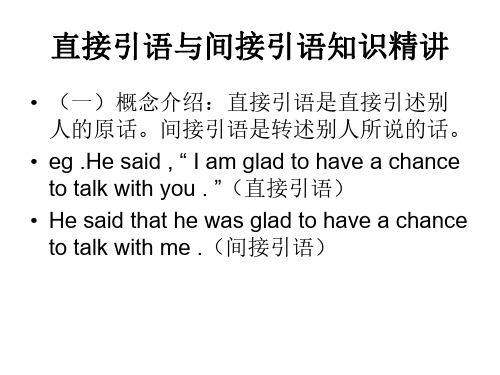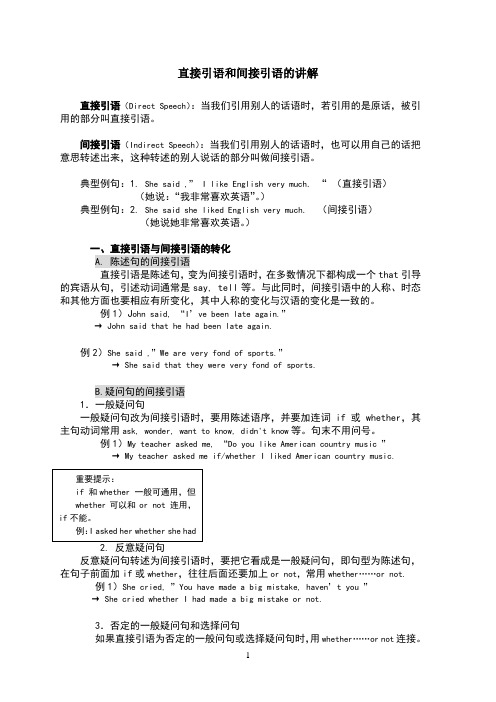直接英语和间接英语
- 格式:ppt
- 大小:296.50 KB
- 文档页数:25

英语直接引语和间接引语直接引语和间接引语(Direct Speech and indirect Speech) 1直接引语:直接引述别人的原话,叫直接引语。
间接引语:用自己的话转述别人的话,叫间接引语。
间接引语在多数情况下构成宾语从句。
直接引语一般前后要加引号,间接引语不用引号。
例如:Mr Black said, “I'm busy” XXX先生说:“我很忙”(直接引语)Mr Black said that he was XXX.XXX先生说他很忙。
(间接引语)1、直接引语如果是陈述句,变为间接引语时,用连词that引导(that在口语中常省略),从句中的人称、时态、指示代词、时间状语、地点状语等要作相应变化。
在这一方面,汉语和英语有许多相似之处,因此,在做直接引语和间接引语转换练时,要特别注意句子的意义。
1)人称的变化a)He said, “I like it very much.”他说:“我非常喜欢它。
”He said that he liked it very much.他说他非常喜欢它。
b) He saidto me, “I've left my book in your room.” 他对我说:“我把书放在你的房间里了。
”He told me that he had left his book in my room.他告诉我他把书放在我的房间里了。
2)时态的变化如主句的谓语动词是一般过去时,直接引语变间接引语时,从句的谓语动词在时态方面要作相应的变化。
如主句的谓语动词是现在时,从句的时态则无需变化。
时态的变化例句直接引语间接引语一般现在时→一般过去时He said, “I'm afraid I XXX work.”He said that he was XXX.现在进行时→过去进行时He said, “I'm using XXX.”He said that he was using the knife.现在完成时→过去完成时She said, “I have not heard from him since May.”She said that she had not heard from him since May.一般曩昔时→曩昔完成He said, “I came to help you.”He said that he had come to help me.过去完成时不变He said, “I had XXX”He said that he had finished his homework before supper.3)指示代词、时间状语、地点状语和动词的变化:变革例句直接引语间接引语this-that这个-那个She said, “Iwill come this morning."She said that she would go that morning.these-those这些=那些He said, "XXX."He said that those books were his.now-then现在-那时He said, "It is nine 0'clock now."He said that it was nine 0'clock then.today-that day本日-那天He said, "I haven't seen her today."XXX.XXX-the day before今天-前一天she said, "I went there XXX."She said that she had gone there the day before.tomorrow-the next(following) day明天-第二天she said, "I'll go there tomorrow."She said that she would go there the next (following) day.here-there这里-那里come-go来-去注:(1)直接引语如果是客观谬误,变成直接引语时,时态稳定。


英语中的直接引语和间接引语一、直接引语和间接引语的概念1. 直接引语- 直接引语就是直接引用别人的原话,被引用的部分通常放在引号内。
例如:He said, "I am going to the park." 在这个句子中,“I am going to the park.”就是直接引语,它原封不动地呈现了说话者所说的内容。
2. 间接引语- 间接引语是用自己的话转述别人的话,不用引号。
例如:He said that he was going to the park. 这里“he was going to the park”就是间接引语,它是对原句“He said, 'I am going to the park.'”的转述。
二、直接引语变间接引语的变化规则1. 人称的变化- 如果直接引语中的主语是第一人称(I或we),在变为间接引语时,要根据句子的意思相应地变为第三人称(he/she或they)。
- 例如:- 直接引语:I said, "I like this book."- 间接引语:I said that I liked this book.(这里因为主语都是I,人称不变,但如果是He said, "I like this book." 变为间接引语就是He said that he liked this book.)- 如果直接引语中的第二人称(you),在变为间接引语时,要根据转述者和听话者的关系变为第一人称(I/we)或第三人称(he/she/they)。
- 例如:- 直接引语:He said to me, "You are a good student."- 间接引语:He told me that I was a good student.- 直接引语:He said to her, "You should study hard."- 间接引语:He told her that she should study hard.2. 时态的变化- 一般现在时变为一般过去时。

一、直接引语直接引用别人的原话叫做直接引语,直接引语通常置于引号内(“引用原话”)。
—“What is it all about?”—“究竟是什么事呢?”—“Nothing serious, just a storm in a teacup.”—“没有什么,大惊小怪而已。
”二、间接引语用自己的话转述别人的意思,或引用自己说过的话,都叫做间接引语。
间接引语多数用宾语从句来表达。
Mary said that she received a sugar report this morning.玛莉说她今天早上收到了一封情书。
He said that his hands were quite full at that moment.他说那时他忙得不可开交。
三、直接引语与间接引语的转换在将直接引语转换为间接引语时,不仅句式上要有变化,而且要在时态、人称、时间、地点等方面作相应的变化。
1、引语转换时的句式变化不同的直接引语句式,如:陈述句、疑问句、祈使句和感叹句,转换成间接引语时要遵循一定的句式转换规则,还要注意根据句意,使用适当的引述动词。
(1)陈述句的间接引语将陈述句转换为间接引语,通常用that引导的宾语从句来表达。
连词that 在不引起歧义的情况下可以省略。
引述分句的动词常见的有say 和tell等。
He said, “I caught a cold yesterday.”他说:“我昨天感冒了。
”He said (that) he had caught a cold the day before.他说他前天感冒了。
Helen said to me, “I’m tired of taking such exams.”海伦说:“我讨厌参加这种考试。
”Helen told me (that) she was tired of taking such exams.海伦说她讨厌参加这种考试。
在下列情况下,往往要保留that。


直接引语和间接引语的讲解直接引语(Direct Speech):当我们引用别人的话语时,若引用的是原话,被引用的部分叫直接引语。
间接引语(Indirect Speech):当我们引用别人的话语时,也可以用自己的话把意思转述出来,这种转述的别人说话的部分叫做间接引语。
典型例句:1. She said ,” I like English very much. “(直接引语)(她说:“我非常喜欢英语”。
)典型例句:2. She said she liked English very much. (间接引语)(她说她非常喜欢英语。
)一、直接引语与间接引语的转化A. 陈述句的间接引语直接引语是陈述句,变为间接引语时,在多数情况下都构成一个that引导的宾语从句,引述动词通常是say, tell等。
与此同时,间接引语中的人称、时态和其他方面也要相应有所变化,其中人称的变化与汉语的变化是一致的。
例1)J ohn said, “I’ve been late again.”→ John said that he had been late again.例2)She said ,”We are very fond of sports.”→ She said that they were very fond of sports.B.疑问句的间接引语1.一般疑问句一般疑问句改为间接引语时,要用陈述语序,并要加连词if 或 whether,其主句动词常用ask, wonder, want to know, didn't know等。
句末不用问号。
例1)My teacher asked me, “Do you like American country music ”→ My teacher asked me if/whether I liked American country music.反意疑问句转述为间接引语时,要把它看成是一般疑问句,即句型为陈述句,在句子前面加if或whether,往往后面还要加上or not,常用whether……or not.例1)She cried, ”You have made a big mistake, haven’t you ”→ She cried whether I had made a big mistake or not.3.否定的一般疑问句和选择问句如果直接引语为否定的一般问句或选择疑问句时,用whether……or not连接。
英语直接引语和间接引语用法讲解引言:英语语法中,直接引语和间接引语是两种常见的引述方式。
在交流和写作中,正确使用直接引语和间接引语能够增加表达的准确性和可读性。
本文将详细介绍直接引语和间接引语的用法,帮助读者更好地理解和运用这两种引述方式。
一、直接引语直接引语是指直接引述他人的原话或句子,通常使用引号包裹,并在引用的句子前后使用逗号或其他标点符号进行标示。
下面是一些直接引语的例子:1. She said, "I am going to the park."2. "Can you help me with my homework?" he asked.3. "It's a beautiful day," they exclaimed happily.需要注意的是,在直接引语中,引述的内容要保持原文的准确性,不得有意省略或更改原话,同时引号的使用要准确,避免引起误解。
二、间接引语间接引语是指通过自己的话来转述他人的原话或句子,不使用引号,而是采用陈述句的语法结构。
在间接引语中,还需要注意变换动词时态和人称。
下面是一些间接引语的例子:1. She told me that she was going to the park.2. He asked if I could help him with his homework.3. They said happily that it was a beautiful day.在转述他人的原话时,要准确地传递原文的意思,避免产生歧义和误解。
此外,在使用间接引语时,还要注意一下几点:1. 当直接引语中有时态或人称变化时,需要将其调整为合适的变化形式。
例如,“I am going” 转述为“she was going”,“Can you help me?” 转述为“he asked if I could help him”。
第九章间接与直接(1ndirect vs.Direct)英语表达倾向于间接、婉约,汉语表达倾向于直接、明快。
这一差异主要见于英语比汉语更多地使用委婉、含蓄和迂回的陈述方式。
一、委婉(Euphemism)委婉说法是用一种比较间接的方式来谈论不宜直言的人或事物,用H.W.Fowler的话来说,委婉语是“a mild or vague or periphrastic expression as a substitute for blunt precision or disagreeable truth”。
人们在说话或写作时,往往会借用温和、动听的委婉语来代替粗鲁刺耳、令人不适的言辞。
使用委婉语常常是为了回避或掩盖某些严酷的社会现实,或为了防止“出语伤人”,避免“有失体统”,以显得文明礼貌。
英语和汉语都有委婉语,尤其见于表达有关不雅、不洁、令人生畏、令人讨厌的人或事物。
如表示“死亡”,英汉的委婉语都特别多,英语有pass away,go to one’s Maker,sleep with one’s fathers,join the great majority,pay the debt of nature,be with God,go to glory,go to a better world,sleep the final sleep,cross the Great Divide,climb the golden staircase等几十种说法;汉语的说法也不少,如“逝世”、“寿终”、“作古”、“谢世”、“归寂”、“坐化”、“牺牲”、“阵亡”、“殉职”、“捐躯”、“百年”、“与世长辞”等,古代还有按等级之分的“死”,如帝王之死是“崩”、“晏驾”,诸侯之死是“薨”,大夫之死是“卒”,士之死是“不禄”等等。
在提及人体的某些功能、缺陷等方面时,英汉也有各自的委婉语,如说“上厕所”,英语常用go to the restroom (washroom),use the bathroom,wash one’s hands,relieve oneself,answer a call of nature,男子可说see a man about a horse,女子可说fix one’s face,powder one’s nose等;汉语则常用“大便”、“小便”、“方便”、“解手”、“大解”、“小解”等。
直接英语和间接英语句型转换•一、句型的变化•(一)如果直接引语是陈述句,间接引语一般是用that来引导。
口语中that常可以省略。
• “I like to listen to rock music,” said Peter.• Peter said that he liked to listen to rock music.•【温馨提示】如果直接引语中出现两个或两个以上的陈述句并列时,第一个that可以省略,后面一个不能省略,以免引起歧义。
如:•The teacher said, “The text is very important. You should learn it by heart.”• The teacher said (that) the text is important and that we should learn it by heart.(二) 如果直接引语是一般疑问句或选择疑问句时,间接引语常变为由whether/if引导,而且要用陈述句语序。
如:1) The boy asked his mother, “Can I go to play football with my friends on Saturday?”The boy asked his mother whether/if he could go to play football with his friends on Saturday.2) “Will you go to the museum this weekend or next weekend?” Li Hua asked me.Li Hua asked me whether/if I would go to the museum this weekend or the next weekend. (三) 如果直接引语是特殊问句,间接引语用特殊疑问词引导,而且用陈述句语序。